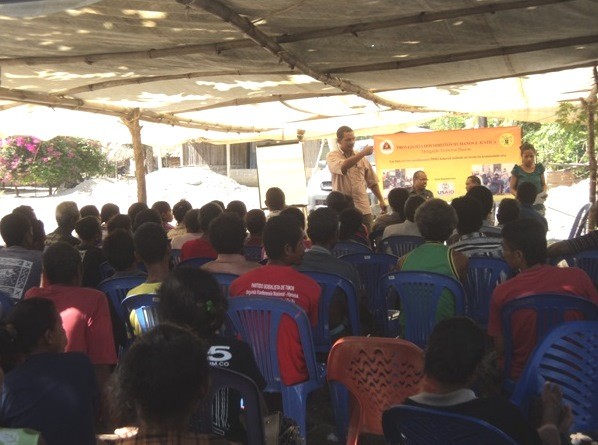Speeches Shim
|
Purpose: To improve the Office of the Ombudsman for Human Rights and Justice’s (PDHJ) ability to advocate for human rights and good governance. |
Location: Baucau, Bobonaro, Covalima, Dili, Oecusse |
|
Partner: Office of the Ombudsman for Human Rights and Justice |
Duration: September 2015 — January 2019 |
|
Government-to-Government Grant: $523,000 |
|
|
Partner Contact: Aureo Savio Director General Email: aureo_savio@yahoo.com |
USAID Contact: Ana Guterres Project Management Specialist |
Summary:
USAID’s Strengthening Decentralization in the Office of the Ombudsman for Human Rights and Justice (ODHJ) Phase II Project improves PDHJ’s ability to advocate for human rights and good governance by increasing community understanding and use of PDHJ services and improving its performance. Co-funded with the New Zealand Ministry of Foreign Affairs, the project is implemented through a direct, government-to-government grant. The project is increasing community awareness of PDHJ’s role and mandate by conducting nationwide outreach events and producing promotional materials; increasing PDHJ’s own awareness of governance and human rights issues affecting communities in rural areas by developing and piloting investigation and monitoring systems at regional offices; and improving PDHJ’s human and organizational capacity by training staff and strengthening its coordination and management systems.

Major Achievements:
- Conducted 166 outreach sessions in rural areas for 12,976 people, 44.8 percent of whom are women. By focusing on topics such as gender-based violence and women's rights in FY 2018, increased female participation at outreach sessions from 44 percent in FY 2017 to 52 percent, surpassing male participation for the first time.
- Increased basic human rights awareness from 50 percent in 2016 to 54 percent in FY 2018.
- Increased from 31 percent in FY 2017 to 40 percent in FY2018 the number of people who understand PDHJ's role.
- Of that 40 percent, increased the percentage of women understanding PDHJ’s role from 42 percent in FY 2017 to 47 percent in FY 2018, which allows women to exercise their rights and seek justice for violations of human rights and good governance.
- All five regional investigators passed examinations on properly conducting investigations in FY 2018, expanding PDHJ’s ability to serve rural areas.
- From September 2015 to September 2018, PDHJ Regional Offices acted on 203 human rights and good governance complaints.
- Produced two good-governance and human rights movie shorts that were broadcast on national television. PDHJ has continued to broadcast radio programs to help educate the people of Timor-Leste on human rights and good governance issues.
- Conducted comprehensive monitoring of school feeding programs, pre-trial detention facilities, and prisons throughout Timor-Leste. Findings reported to the government included:
- A lack of separation of male, female, and juvenile detainees, overcrowding and inhumane treatment.
- Lack of transparency in budget execution and ineffective control mechanisms in the school feeding program.


Comment
Make a general inquiry or suggest an improvement.